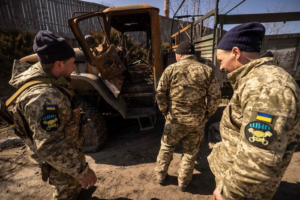

BEIJING—New limits on for-profit education services imposed by the Chinese government are upending the carefully laid plans of millions of parents—liberating some from what they have come to regard as a money-draining competition, while driving others to find new, more expensive ways to give their kids a leg up.
In recent weeks, policy makers have dealt a blow to a multibillion-dollar industry whose customer base was built around families in China’s biggest and wealthiest cities. Public advertising of the services is now forbidden, as is the scheduling of classes during weekends and holidays, with online classes newly capped at a half-hour per session.
The goal, say policy makers, is to lower the costs and anxieties of child rearing in a bid to encourage a higher birthrate—a rising policy concern amid signs of a demographic contraction in China.
Chinese leader
Xi Jinping
also has made clear he wants to reduce inequalities in educational opportunity and social advancement, particularly between China’s prosperous cities and its far less developed rural areas.
Roughly seven in 10 students between kindergarten and 12th grade receive after-school tutoring in the country’s most prosperous cities, according to the government-backed Chinese Society of Education. In these large urban centers, intense competition has pushed parents to enroll children in extracurricular English and math classes as early as kindergarten.

China’s leader Xi Jinping, shown visiting a school last year in Ankang, Shaanxi province, has made clear he wants to narrow inequalities in educational opportunities.
Photo:
Xie Huanchi/Zuma Press
“These institutions are mixed, both good and bad,” China’s Education Ministry said late last month in its policy announcement, referring to the for-profit academies. “If left unchecked, they will form another education system outside the national education system.”
At the same time, the government has taken action against so-called school district housing—apartments near in-demand schools that long guaranteed coveted placements for children living there.
In recent weeks, Beijing and Shenzhen have begun delinking apartment locations from school placement guarantees and in some cases rotated teachers from one school to another—instantly freezing once-hot markets for expensive apartments in neighborhoods near top schools.
The moves fall short of more drastic overhauls to the formal education system that some experts have advocated—creating more university spots to reduce competition, for example, or moving away from the standardized tests that fuel the cram-school culture.
Nevertheless, the dramatic policy shifts have been jarring for parents—including for those who otherwise share the government’s longer-term objectives. Some are scrambling for ways to secure extra tutoring for their children, even as they hope the new measures will reduce academic competition.

A student is greeted after completing China’s grueling national college entrance exams, which determine admittance to the country’s top universities.
Photo:
Andy Wong/Associated Press
Gao Cunping, a Beijing mother whose eighth-grade daughter is preparing to enter the critical final year of middle school—when competition for high school placements is most intense—has scrambled in recent days to find alternatives for her daughter’s regimen of after-school classes.
Ms. Gao’s daughter is enrolled in one math and one physics course—both of them conducted online—from TAL Education Group, a U.S.-listed Chinese private-education giant with hundreds of branches across the country. Shares in TAL, whose Chinese name means “Bright Future,” were among those that plunged in recent weeks amid the new government regulations.
To fill the void left by the new regulations, Ms. Gao is looking to hire one-on-one private tutors for her daughter, though they can cost substantially more and Ms. Gao fears they might soon be swept up in the government restrictions as well.
“As the curriculum gets more difficult in high school,” said Ms. Gao, “it’s important for her to get an extra boost from these tutoring sessions.”

New policies in China now prohibit extracurricular classes on weekends and holidays.
Photo:
Peng Ziyang/Zuma Press
Sun Wen, a mother in the eastern Chinese city of Hangzhou, says she is encouraged by the government effort, adding that she hopes her son will be able to play more and enjoy a happy childhood. If other parents agreed not to push their children into these programs, she said, she would gladly do the same—saving on money and stress.
“Almost everyone takes these courses before first grade,” Ms. Sun said. Her son studied arithmetic and learned Chinese characters as part of a paid course through
New Oriental Education & Technology Group Inc.,
a Beijing-based private-education titan whose shares have lost roughly 90% of their value in the past six months as the government crackdown has sharpened.
First-grade teachers take it for granted that parents have enrolled their children in similar classes, and quickly race through the standard curriculum to get to more advanced material, Ms. Sun explained. Though she had misgivings about putting her son through such a rigorous program so early in life, fear of falling behind prompted her to register her son. “Students who don’t take part in these lessons before would find it difficult to follow,” she said.
For mothers like Ms. Gao and Ms. Sun, there is still time to adjust to the new reality. It has been harder for families who plowed their savings into a school-district apartment in hopes of winning a placement for their children.
In Beijing’s Xicheng District, widely regarded as home to some of the city’s best schools, a homebuying frenzy in recent years had pushed prices to astronomical levels.
Now, seemingly overnight, home transactions in some of the fastest-rising pockets of the district have ground to a virtual halt, according to real-estate brokers, as parents weigh the impact of the new government measures. One agent said several buyers had chosen to walk away from planned purchases, in some cases forfeiting down payments worth tens of thousands of dollars, since the new regulations were rolled out.
With student placements now assigned by lottery rather than being determined strictly on proximity to desirable schools, some families who poured life savings into apartments are filled with regret.
One Beijing mother was devastated after her daughter failed to win admission to a Xicheng District middle school that they had long set their sights on, despite spending more than $1.2 million last year to buy a closet-sized apartment nearby.
“I cried with my child after learning the result,” said the mother, who declined to be named. “She performed so well at school and now we have to accept a second-rate school after spending so much for a shabby apartment.”

Roughly 70% of K-12 students receive after-school tutoring in the country’s most prosperous cities, according to the Chinese Society of Education.
Photo:
noel celis/Agence France-Presse/Getty Images
For others, including a 37-year-old stay-at-home mother of two surnamed Fang, the government’s campaign to overhaul the system is welcome. The cost alone of the status quo is mind-boggling, never mind the stress involved, she said of the more than $450 she spends each week on after-school classes—Chinese, math, English, ballet and gym for her second-grade daughter; English, painting, piano, skating and gym for her 5-year-old.
“It hurts my head just thinking about managing both of their schedules,” she said, calling tutoring fees her family’s biggest expense—apart from the more than $1 million they spent buying an apartment near the schools they aimed to enroll their children in.
Though she hopes the government succeeds, she is also skeptical that authorities can change the deeply rooted mind-set that underpins increasing educational and societal anxiety.
“If admissions criteria are based on test scores, no matter how many policies the country comes up with, it won’t work,” said Ms. Fang.
One of her daughter’s extracurricular English-language classes runs afoul of the current rules because it takes place on weekends, so Ms. Fang is planning to reschedule it for a weekday, while buying more English-language books for her daughter to read at home.
“Maybe it’s a good opportunity to let the kids explore what they are really interested in,” Ms. Fang said of the new government drive. “It also takes time for both parents and the kids to get used to this new life with fewer classes.”
—Grace Zhu contributed to this article.
Write to Jonathan Cheng at jonathan.cheng@wsj.com
Copyright ©2021 Dow Jones & Company, Inc. All Rights Reserved. 87990cbe856818d5eddac44c7b1cdeb8
















